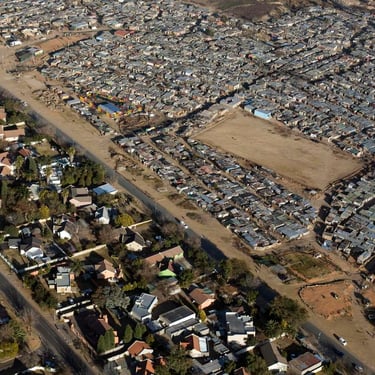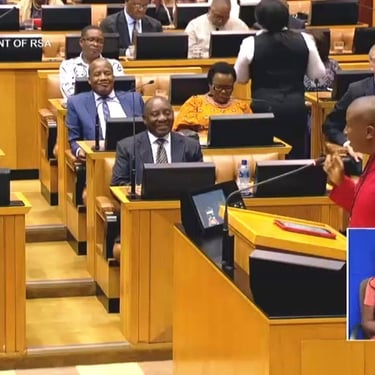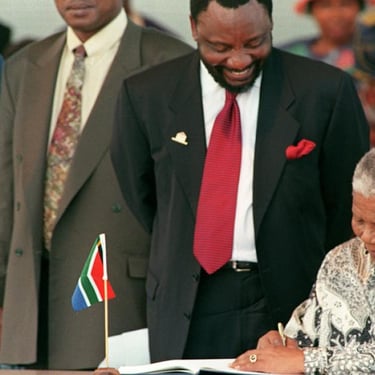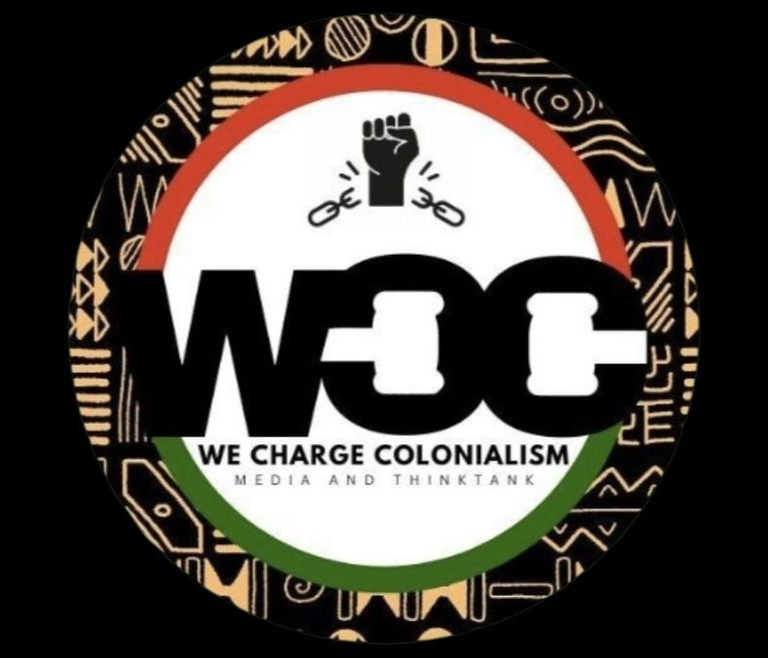Colonial Constitutions
Why “South Africa” Will Never Give Afrikans their Land Back
“There is no need for the widespread concern. The farming community have nothing to fear. Restitution can be done without depriving people who already have property. There is no danger of us dispossessing people of property, no danger at all.” – Nelson Mandela, November 18, 1994
Living By the Laws of the Minority
Afrikan people are at a pivotal time that requires us to deal with the facts as they are and not what they ought to be.
Our oppressors tell us: things aren’t so bad. Equality and justice are right around the corner. The current course we are on will undoubtedly pay off in the end. Most of us sheepishly accept this telling of facts because we have no frame of reference for who we are and what we were before them. Not wanting to deal with the difficultly and struggle that comes with living by our own paradigm, we continue living in their system and abiding by their rules as lambs being led to slaughter.
The most insidious construct Afrikans have been forced into is the White man’s system of law. This colonial system receives validation globally and controls Afrikans on multiple levels, as high up as the United Nations and as low as our regional towns. While some occasionally challenge the execution of this legal framework, such as Muammar Gaddafi tearing up the UN Charter at the General Assembly, there has been little discussion on whether these systems should have any legitimacy outside of Europe.
Instead of calling for an outward rejection of international legal institutions, we attempt to utilize them to appeal to. Much can be said about the UN and ICC, and how these institutions are intrinsically created to bound colonized countries to the rule of White colonists without any substantive recourse. But the focus of this article is even more fundamental and close to home. This discussion will center on the rule of law we have been forced into by our colonial constitutions.
Locked into Landlessness
In South Africa, a country where the White population makes up no more than 10 percent of the population yet owns 90% of private land, while the indigenous Afrikan population comprises over 80% of the population yet own less than 4% of private land, a recent proposal put forth by the ANC to amend the Constitution to allow for land expropriation without compensation fell through. While the proposal was unordinary for the ANC, a party historically resistant to taking drastic action against White oligarchy, in reactionary fashion the constitutional amendment was vague and likely weak in application. The EFF, however, a party known for their unyielding call for “land expropriation without compensation” refused to deliver the necessary votes to the ANC for the amendment.
Their positions were reminiscent of many clashes Afrikans have had throughout the continent and diaspora, as some want complete freedom from colonial vestiges, others want gradual freedom, and others no freedom at all:
“The EFF wants all land under the custodianship of the state. The ANC inserted “custodianship of certain land” (although vague as to what this means) as a compromise, but this was not enough for the EFF to agree. The ANC also resisted deleting section 25(2), which places a duty on the state to compensate for expropriation. A carefully worded “may expropriate at nil compensation” leaves the obligation to compensate by clarifying that in some instances, just and equitable may be nil (rand). The EFF wants it to state “without compensation”, and basta.” [1]
One party that wants no freedom from the colonial system at all is the Democratic Alliance (DA), a White Afrikaner political party that celebrated the amendments downfall, proclaiming:
“We have long argued against the need to amend Section 25 of the Constitution because, in its current form, it already has enough provisions to enable a just and equitable land reform process… What South Africa needs is a pragmatic and rational approach that will operate within the confines of current constitutional provisions on land reform. Nationalisation of land and the exclusion of the courts from adjudicating land expropriation cases, as proposed by the ANC and the EFF, would have undermined the rule of law and reduced South Africa to an economic wasteland.”[2]




This DA proclamation was distasteful considering the fact that to date failed policies such as “willing buyer, willing seller,” where the state relied on White occupiers’ willingness to sell the land for reallocation, has failed to result in land transference. But while the Constitution in practice is inequitable, the DA in issuing this statement revealed the true purpose of the Constitution, whether we like it or not. That is to confine Afrikan people to colonial “rule of law.” In that rule of law, White power is necessarily preserved, as they are the givers of their rule of law.
A Defunct Constitution for a Defunct National Identity
“South Africa,” that is the Republic of South Africa formed officially in 1961 while formal apartheid was in full force, will never return stolen land to indigenous Afrikans. Throughout the early 90s, negotiations between the White nationalist government and Nelson Mandela about what an “end” to apartheid would look like was inundated by Western rule of law without even the slightest nod to the law indigenous to the land the settler colony sat on. Notably was the innovation of a German Constitution-inspired property clause, further solidified by the American Constitution-inspired limitations clause, which restricts infringements on constitutional rights to “limited” and “less restrictive” government action. [3]
When reading the Constitution of South Africa, it is not difficult to see the blatant restraints for the prospective of land reclamation for dispossessed Afrikans. As to the right to property the South African Constitution reads:
1. No one may be deprived of property except in terms of law of general application, and no law may permit arbitrary deprivation of property.
2. Property may be expropriated only in terms of law of general application
a. for a public purpose or in the public interest; and
b. subject to compensation, the amount of which and the time and manner of payment of which have either been agreed to by those affected or decided or approved by a court.
3. The amount of the compensation and the time and manner of payment must be just and equitable, reflecting an equitable balance between the public interest and the interests of those affected, having regard to all relevant circumstances, including
a. the current use of the property;
b. the history of the acquisition and use of the property;
c. the market value of the property;
d. the extent of direct state investment and subsidy in the acquisition and beneficial capital improvement of the property; and
e. the purpose of the expropriation. [4]
Intentionally, this constitutional rule is not retroactive. Meaning those arbitrarily deprived of land already are completely unshielded from past wrongs, no matter how egregious. But. Not to fear, indigenous Afrikans in are given this vague promise of hope:
“5. The state must take reasonable legislative and other measures, within its available resources, to foster conditions which enable citizens to gain access to land on an equitable basis.” [5]
The Constitution of South Africa, much like every colonial constitution, is a carefully worded document meant to convey the appearance of compromise. In this sense, colonial constitutions are tasked with wordily denoting hope to the colonial subjects while also securing confidence from the ruling class that this hope will not lead to a transfer of actual power. By agreeing to abstract non-actionable rights, the colonist class is tasked with taking their own action to secure their interest, which they do in haste.
Like all Western-style democracies, White control of the economics in colonial democracies is control over the politics. In Afrika, where money-hungry politicians consistently sell out their constituents for their own economic benefit, colonial constitutions are easy for the monopoly capitalist to manipulate and control through political bribes and flooding the media with propaganda.
Prior to ratification of any colonial constitution, business interests, political connections, and a planned economy are already secured by the colonial taskmaster. After ratification, the colonial class springs further into action by lobbying (bribing) government officials, infiltrating non-governmental organizations, and appealing to their imperialist kinsmen for diplomatic backing in case of local dissent going against their favor. Then of course, as an added layer of security, they ensure the colonized are socially and physically isolated from those wielding power, with police and military force readily available to act if the colonial subjects become uncontrollable.
The ANC’s Original Sin
“The nationalisation of the mines, banks and monopoly industries is the policy of the ANC, and a change or modification of our views in this regard is inconceivable. Black economic empowerment is a goal we fully support and encourage, but in our situation state control of certain sectors of the economy is unavoidable.” – Nelson Mandela Jan. 15, 1990
Madiba Nelson Mandela was a freedom fighter, no one should doubt that legacy or make light of the insurmountable price he paid for his activities in the liberation struggle. However, Mandela was also chosen, and not for his prior revolutionary stances against the apartheid state.
Lord Robin Renwick, an agent of the British imperialist crown who during the course of his career specialized in the maintenance of White supremacy in “decolonized” zones, for whatever reason saw in Mandela traits he looks for in his partners, someone “amicable to working with the British; willing to keep the economy in the hands of White Monopoly Capital, and; willing to accept the neo-colonial constitution drafted by the British that served to protect White minority rights.” [6] Renwick, who became a close advisor to Mandela, was instrumental in him abandoning the ANC’s previous policy on nationalization and thus locking the people of South Africa in a contract where monopoly capitalists would continue to control the economy. In fact, Mandela’s ANC in negotiating for post-apartheid South Africa agreed to the following: “
· Lower import tariffs;
· Cuts in state spending,
· Large cuts in public sector wages;
· Free trade routes;
· Excessive flight capital off the borders of SA;
· Privatisation of state own enterprises;
· Fiscal controlled economy; and
· Last but very importantly, the ANC must move away from its radical position of nationalisation of mines, banks, other strategic industries of the economy and to abort its policy of expropriation of land as documented in the Freedom Charter.”[7]
When Stolen Land Ceases to be Stolen
Under what conditions does stolen land cease being stolen? That depends greatly on the paradigm you adopt in answering that question. The unfortunate reality is much of the land expropriation debate centers on a European standard of law without formally discussing whether that rule of law is worthy of public adherence.
The Eurocentric legal concept of private property, which has been imposed on Afrikans, centers on accumulation and profit maximization:
“The colonisers brought with them a Eurocentric perception that land was a commodity to be purchased and sold. Of course the legal justification in the form of laws, particularly English common and Roman-Dutch laws, was used to legitimise the commoditisation of land.
Property is seen to be exclusive to the individual. This is the core of capitalist relations, which are embedded in colonial modernity. The history of property rights in European thought can be traced back to the 1215 Magna Carta, which served to protect privileges and rights of the nobility against state interference.
In Western Europe land was of great value and defined one’s wealth, status and social, economic and class position. It is little surprise that when colonialists arrived in the colonies and stumbled across vast swathes of land, they viewed this as a stroke of fortune. Land provided an opportunity for accumulation, wealth and prosperity for those who had emanated from deprived backgrounds in Europe.”[8]
What we can gather naturally from this infatuation with private land ownership is the inextricable link it has to the colonial state. That is colonialism necessitates private property, as private property necessitates colonialism. In addition, communalism, the Afrikan indigenous tradition which leaves the enslaver class without any individual claims to the land or resources, necessarily destroys colonialism. For this reason, talks about nationalization automatically prompt resistance from the White globalist elites who know very well that communal ownership would put Afrikans on a road to true decolonization.
It must be emphasized, communalism is an indigenous feat of Afrika. Private property is not:
“African land laws debunk the idea of ownership. Instead land is a natural endowment that can neither be bought nor sold. African land tenure is not based on ownership but on use and access. Since Africans have common rights to land, communal rights override individual rights, which are subsumed to the overall communal good… There is a need to transcend the flawed economic determinist view current in land debates that denies Africans the right to land on the premise that they would not be able to productively use the land. For Africans land is everything. Depriving one of land means robbing them of their personhood, being and identity - in other words their full humanity.”[9]
Based on this indigenous Afrikan understanding, one would rightfully reach the conclusion that the South African Constitution is not an Afrikan constitution. As with all constitutions written with the consent of imperialist, it is a colonial constitution only meant to restrain the masses while depriving them of land. So what do we do with these colonial legal instruments?
Wipe the Floor
A colonial constitution is a reminder as to how devious and conniving the rule of law is in offering abstract non-actionable “inalienable” rights to pacify mass resistance. We would be fools, however, to respect the documents handed to us by our enslavers or work within their frameworks.
Clearly, if we choose to rectify the colonial situation under a Eurocentric legal framework we are forever accepting a servile place in history. However, once we accept that the Constitution of South Africa along with any other colonial constitutions will never free us, then the conversation of “any means necessary” becomes radically shapeshifting.
Addressing our problems for what they are will not be easy, but it is the first actionable step towards independence and freedom.
[1] Elmien du Plessis, No Expropriation without Compensation in South-Africa’s Constitution – for the Time Being, Verfassungsblog, (Dec. 9, 2021) https://verfassungsblog.de/no-expropriation-without-compensation-in-south-africas-constitution-for-the-time-being/
[2] Annelie Lotriet ,Failure to pass the Section 25 Amendment Bill a victory for South Africa’s constitutional order, Democratic Alliance, (Dec. 7, 2021) https://www.da.org.za/2021/12/failure-to-pass-the-section-25-amendment-bill-a-victory-for-south-africas-constitutional-order
[3] Constitution of the Republic of South Africa, 1996 - Chapter 2: Bill of Rights, https://www.gov.za/documents/constitution-republic-south-africa-1996
[4] Id.
[5] Id.
[6] Black Opinion, Who Is Lord Robin Renwick Julius Malema’s Handler From London?, (April 13, 2016), https://rgb(0, 0, 0)opinion.co.za/2016/04/13/who-is-lord-robin-renwick-julius-malemas-handler-from-london/
[7] How Mandela’s ANC sold out the economic struggle, News 24, (April 22, 2014) https://www.news24.com/News24/how-mandelas-anc-sold-out-the-economic-struggle-20140422
[8] Kenneth Tafira, Why land evokes such deep emotions in Africa, May 27, 2015, https://theconversation.com/why-land-evokes-such-deep-emotions-in-africa-42125
[9] Id.
